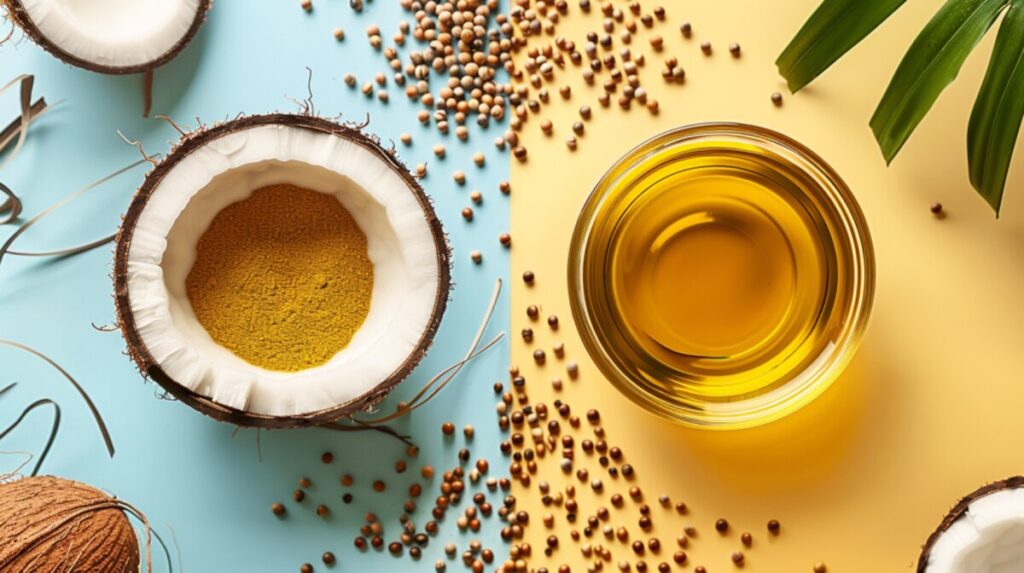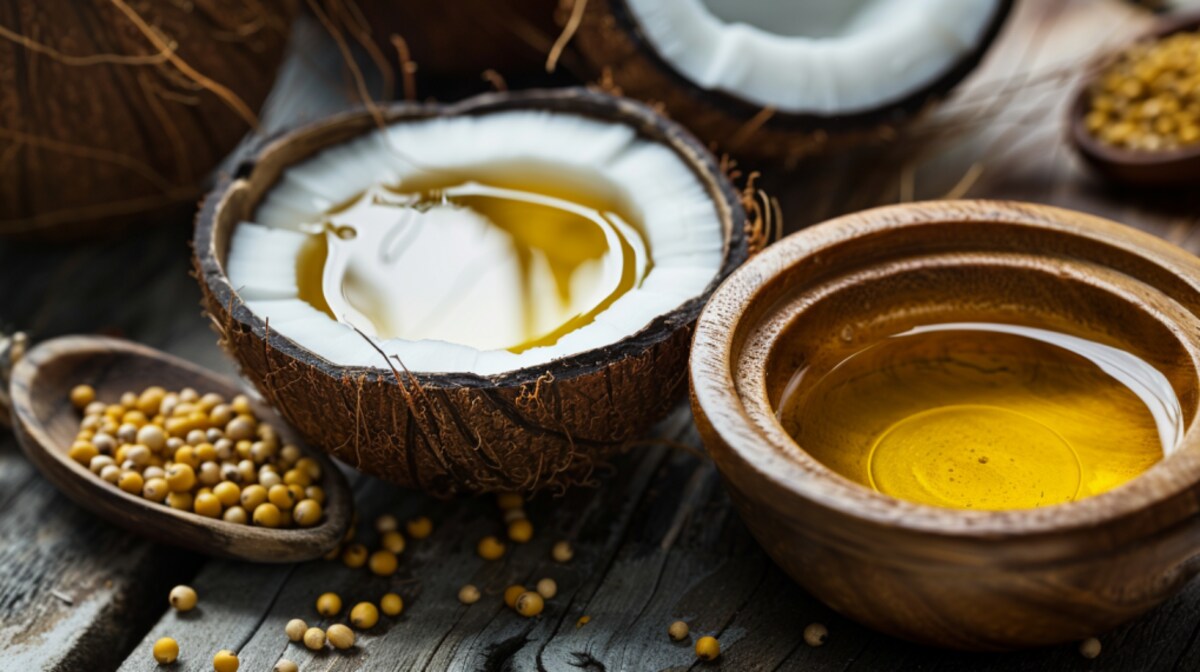When it comes to hair care, traditional oils such as coconut oil and mustard oil have been dominating the market for centuries. Praised for their amazing benefits, both coconut oil and mustard oil have unique properties that make them an essential part of traditional hair care rituals for many people. If you are looking for a comparison of coconut oil vs. mustard oil for hair, continue reading this article to make an informed choice.
Coconut Oil vs. Mustard Oil
While coconut oil is extracted from the core of dried mature coconuts, mustard oil is made from mustard seeds. Both of these oils are rich in nutrients and have several therapeutic properties. Coconut oil is rich in saturated fats and is known for its antibacterial and antifungal properties and several health benefits. On the other hand, mustard oil is abundant with unsaturated fats, omega-3 and omega-6 fatty acids, and other compounds that have distinct health benefits. Unlike coconut oil, mustard oil has a very strong, pungent smell. Coconut is lighter than mustard oil and has a pleasant smell.
Hair Benefits of Coconut Oil and Mustard Oil
While considering the benefits of coconut oil vs. mustard oil for hair, its texture, nutritional value, and physical as well as chemical properties also need to be considered. Both coconut oil and mustard oil are popular for their hair-nourishing properties.

Coconut oil for hair
Coconut oil is widely used in India and some other Asian countries to improve the growth, conditioning, and nourishment of hair. Due to its mild aroma and flavour, coconut hair oil is used for the conditioning of hair before and after the hair wash. It can also be used as an organic hair mask to moisturise your scalp and hair, thereby preventing hair breakage, split ends, hair loss, thinning, etc.
Coconut oil has the ability to penetrate deeply into the hair shaft, supplying intense moisture and preventing protein loss. The moisturising property of coconut oil makes it the perfect natural solution for dry, damaged, or even chemically treated hair. The antifungal properties of coconut oil are helpful to prevent scalp dryness and fungal issues.
Coconut oil is beneficial to fight dandruff, frizziness, and fungal and bacterial infections of the hair. Coconut oil is the base of many hair oils available in the market today. Many Ayurvedic hair oils are formulated using coconut oil- Neelibringadi Coconut Hair Oil, Parachute Advanced Ayurvedic Hair Oil, etc. are some of the popular hair care oils in which coconut oil is a key ingredient. The regular use of coconut oil may also add shine and volume to your hair.
Coconut oil can be applied as a pre-wash moisturizer, a leave-in conditioner, or a scalp treatment medication. The versatile properties of coconut oil make it good enough to be mixed with other oils in natural remedies and Ayurvedic medicines for better hair care therapies.
Mustard Oil for Hair
Like coconut oil, mustard oil also has hair growth-stimulating properties. In India, the ancient generation used mustard oil for hair growth and even body nourishment. Regular use of mustard oil on hair can improve its growth, preventing hair loss.
Some studies indicate that mustard oil can reduce hair fall in people with baldness and alopecia. The allyl isothiocyanate present in mustard oil increases blood circulation to the scalp, improving the supply of oxygen and nutrients to the hair follicles. This compound inhibits the production of the dihydrotestosterone (DHT) hormone, which causes the shrinkage of hair follicles and hair loss.
The high content of vitamins A, D, E, and K, along with beta-carotene, in mustard oil stimulates hair growth and provides a healthy scalp. Mustard oil is also very effective due to its antibacterial and antifungal properties.
Compared to coconut oil, mustard oil has a pungent smell, which makes it sticky after application to the hair. If you use mustard oil on your hair, shampooing is a must because the greasy and strong smell of mustard oil can do more harm to your hair than good.
Nutritional Benefits of Coconut Oil vs. Mustard Oil
Coconut oil is composed primarily of medium-chain fatty acids, especially lauric acid, which has a high connection with hair proteins. This fatty acid presence in coconut oil makes it strong enough to penetrate the hair shaft more effectively than other oils.
While considering the vitamins and minerals, both oils are rich. While coconut oil has a higher concentration of vitamin E and antioxidant properties, mustard oil is a good source of vitamins A, D, E, and K, supplying a comprehensive range of nutrients.
Mustard oil’s antifungal and antibacterial outcomes make it better for maintaining a healthy scalp and preventing various infections. Similarly, coconut oil also has antimicrobial effects but is more useful in moisturising and pacifying an irritated scalp.
When it comes to coconut oil vs. mustard oil for hair, both have their own nourishing and growth properties. Both oils have hair-strengthening benefits. Coconut oil is effective in reducing protein loss and strengthening hair from within, while mustard oil can stimulate blood circulation on the scalp, promoting healthier hair growth.
Application Methods
When it comes to hair oil application, it is always better to heat the oil slightly before usage for more effectiveness. To apply coconut oil, heat a small amount of oil and massage it into your scalp and hair. You can also warm the oil between your palms for massaging. Just leave the oil on the hair for a maximum of 20 to 30 minutes for conditioning effects. Nowadays, haircare experts don’t recommend the overnight application of hair oil because it can cause other health issues. Rinse thoroughly with shampoo after the mentioned time, and wrap your hair with a warm towel for a soothing benefit.
Mustard oil can also be applied to your scalp after heating it; massage it in circular motions for better results. Leave it on for 20 minutes before washing it out with shampoo. Make sure that you rinse off the oil with shampoo because keeping mustard oil on the hair will give you a greasy look.
Coconut oil can be used 2-3 times a week for best results, while mustard oil is generally recommended once a week due to its strong fragrance and stimulating properties.
Allergy Considerations:
Both oils can induce allergic reactions in rare cases. If you experience any side effects, such as allergy, dandruff, or sensitivity issues, discontinue use and consult a dermatologist. Mustard oil is recommended only for dry to normal hair, as it provides nourishment and stimulates hair growth without causing greasiness.
Scientific Indications on Coconut Oil & Mustard Oil
Several studies have indicated that coconut oil can reduce protein loss in hair and improve hair health. Its ability to penetrate the hair follicles makes it a superior conditioning agent. Though research on mustard oil is limited, traditional haircare therapies and practices support its use for stimulating hair growth and maintaining scalp health.
You may also like to know the Benefits of Rosemary Water for Hair
Conclusion
Both coconut oil and mustard oil offer unique benefits for hair care. Coconut oil is perfect for deep conditioning and moisturising, making it ideal for dry and damaged hair. Mustard oil, with its stimulating properties, is suited for promoting hair growth and maintaining scalp health. Depending on your hair type and scalp condition, you might choose the one that works better for you. Modern-day medicines and health practitioners don’t recommend regular application of oil to the hair and scalp, attributing various side effects and potential drawbacks. Still, a lot of haircare oils available in the Indian market boast the incorporation of coconut oil as their main ingredient. Coconut oil would be my recommendation for hair growth because of its lightweight and biological properties. It effectively reduces frizz, promotes scalp health, eliminates dandruff, and boosts hair growth effortlessly. Unlike heavier oils, coconut oil achieves these benefits without leaving your hair greasy, ensuring a nourished and shining look. You can get help from an Ayurvedic doctor to choose the best hair oil.
FAQs
- Can these oils be used on colour-treated hair?
Both coconut oil and mustard oil are generally safe for colour-treated hair. If you have allergies or oil sensitivity, do a patch test before use.
- Is it safe to use coconut oil and mustard oil together?
Yes, you can use both oils together. Mustard oil has slightly harder properties, so mixing them together can ensure deeper conditioning without much heaviness. Consider your hair type before mixing both oils.
- How long does it take to see results?
Results can vary depending on your hair type and conditions. Generally, consistent use of these oils for a few months should show noticeable improvements.
- Can I use these oils for other beauty purposes?
Yes, both oils have multiple benefits. Coconut oil is great for skin moisturising and makeup removal, while mustard oil can be used for massages and skin care.
Disclaimer: This content is for informational and educational purposes only and should not be considered a substitute for professional medical advice, diagnosis, or treatment. It is crucial to consult your healthcare provider before initiating any new treatments or therapies.



